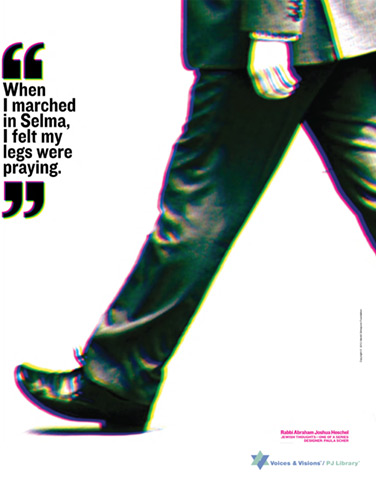
"When I marched in Selma, I felt my legs were praying."
-Rabbi Abraham Joshua Heschel
Voices & Visions Dvar Torah
Congregation B'nai Torah - Forest Park Minyan (Springfield MA)
Shabbat Nitzavim-Vayelekh, August 31, 2013
By Dr. Rick Granowitz
My first task in addressing you is to answer the weekly mystery: Why this poster this week?
As you can see in the famous photo (below), Rabbi Abraham Joshua Heschel in 1965 walked arm in arm with civil rights leaders, including the Reverend Martin Luther King, Jr., in a march from Selma to Montgomery, Alabama. After the march, Heschel wrote: "I felt a sense of the holy in what I was doing. For many of us, the march ... was about protest and prayer. Legs are not lips and walking is not kneeling. And yet our legs uttered songs. Even without words, our march was worship. I felt my legs were praying."

It was not until this past Wednesday that I looked at the front page of The Republican and realized this week marked the 50th anniversary of the civil rights "March on Washington for Jobs and Freedom". That march in 1963 is best remembered for MLK's famous "I have a Dream" speech, in which he proclaimed: "I have a dream that my four little children will one day live in a nation where they will not be judged by the color of their skin, but by the content of their character."
After identifying a connection between Paula Scher's poster and this week in history, my next step was to link the poster and the Parsha. Notwithstanding the link between the word "march" in Heschel's quote and "VaYelekh" ["And he (Moses) went"] -- the first word in the second half of today's double parsha, I took the liberty of going back to last week's parsha, Ki Tavo, 26:16-17 -- This day, HaShem, your G-d, commands you to perform these decrees and statutes, and you shall observe and perform them with all your heart and all your soul. You have distinguished HaShem today to be a G-d for you, and to (here's the connection) WALK in His ways, and to observe His decrees, His commandments, and His statutes, and to hearken to His word.
These pesukim describe the three pathways to an awareness of G-d -- prayer, Torah study and good deeds. The phrase "With all your heart and all your soul" is found in the Shema, Judaism's quintessential prayer. "To hearken to His voice" is a call to Torah study. Finally, the phrase "To walk in his ways" instructs us to do good deeds. The three pathways are discussed in the Talmud and lovingly expounded upon by Heschel in his most famous book, "G-d in Search of Man".
The quote in the poster emphasizes the connectedness between 2 of these 3 ways -- between doing good deeds and prayer. When Heschel marched with the Rev. King from Selma to Montgomery, the good deed performed by his legs made him feel as if he was praying.
My final task as a Voices & Visions speaker is to identify the connection between the poster and the Judaic season. Our quote, uttered by a Rabbi, is predicated on concern for Gentiles, not fellow Jews. This universalism is one of the important themes of the holidays in the upcoming month of Tishrei. One example is the 70 bulls sacrificed on Succot, commemorating the 70 nations of the world.
The concept of universalism is also evident in the best known biblical reading of the Yamim Nora'im. In Sefer Yonah, the Prophet is the only Jew in the narrative. He prophesies and exhorts non-Jews, the Ninevites, to repent. When the Ninevites do repent, they, their children and even their cattle are spared from destruction. By assigning Yonah his task and accepting the Ninevites' repentance, G-d is showing us His love for all his creatures, both Jews and non-Jews. Taking one last look at Paula Scher's poster, we see Heschel's embodiment of love for all his fellow man.
